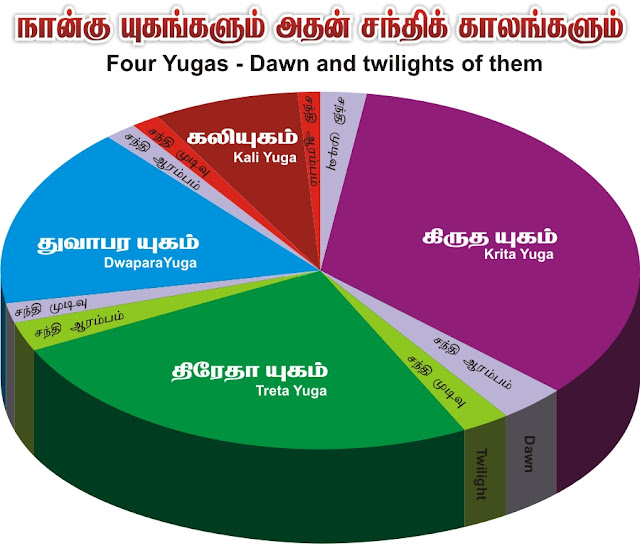CHAPTER VIII
(THE DURATION AND CHARACTERISTICS OF YUGAS)
Vaishampāyana said:— O Janamejaya, the learned have described the Satya-Yuga as extending over four thousand years. And to each period of junction, at the commence ment and termination, has been alloted four hundred years (1). Virtue had at that time four legs and sin one, and men, observant of their own duties, used to celebrate sacrifices. During that age the Brāhmanas used to perform their own duties, the kings used to follow their own duties, the Vaishyas were busy with the work of cultivation and the Sudras with serving (others) (2-3). Truth, the quality of goodness and religion flourished and people used to receive. instruction from others for following the pious (4). O Bhārata, such was the conduct of all men in the Krita-Yuga whether of the religiously-minded or of persons born in low lives (5).
The duration of the Tretā-Yuga was three thousand years and that of its commencement and termination severally extended over three hundred years (6). During that period virtue had three legs and sin two. Truth and the quality of goodness continued intact as in the Krita-Yuga. Desiring for the fruits of religious practices mankind was vitiated. And accordingly the religious rites of the four orders suffered deterioration and they grew weak. O king, thus the work of the Tretā-Yuga, as ordained by the gods, has been described to you. Listen now to the work of Dwāpara (7–9). O foremost of Kurus, the duration of Dwāpara extended over two thousand years and that of its two periods of conjunction was two hundred years each (10). During that age wise Brāhmanas were born as being selfish, possessed by the quality of Rajas (self-centering tendency), deceiptful, mean-minded and of perverted nature. Virtue had two legs and sin three and therefore the bridges of eternal religion were gradually perverted (11-12). True Brahmanahood disappeared, faith in God was shattered, and Vrata, fasts and other religious rites were abandoned (13). The duration of the Kali-Yuga is one thousand years that of its two periods of conjunction is one hundred each (14). During this period virtue has one leg and sin has four. Men are born as being lustful and possessed by the quality of Tamas (disorganizing tendency). None practises fast, none behaves like a pious man and none speaks the truth. Every man becomes an atheist or Brahma-vādin. Everyone becomes haughty and devoid of the feeling of affection. The Vipras will behave like the Sudras and the Sudras will be endued with the characteristics of the Brāhmanas (15-17). In the Kali-Yuga people will violate the Ashramas, procreate offspring by promiscuous intercourse and know women whom they should not know. Thus, O Janamejaya, twelve thousand years constitute a Yuga and seventy-one Yugas constitute a Manawantara. At the time of the termination of a cycle no one doubts the three Vedas. The learned consider twelve thousand celestial years as constituting a Yuga. And a thousand of such Yugas forms one day of Brahmā's (18–20).
O Bhārata, after the passing away of this day the great lotus-navelled Deity, the lord of great elements, witnesses the decay of the body of the Brāhmanas, Daityas, Dānavas, Yakshas, Rakshas, Gandharvas, Kinnaras, Apsarās, celestial Rishis, Brahma Rishis, Royal Rishis, serpents, mountains, rivers, beasts, birds, deer and other creatures. Then resorting to his world-destroying intelligence he performs dreadful feats for bringing the universe into dissolution (21-25). In the form of the sun he takes away the vision of all creatures, in the shape of the wind he takes away their vital breaths, in that of the fire he consumes all the worlds and in that of the cloud he again sends down unfavourable showers (26).
Source: https://archive.org/details/AProseEnglishTranslationOfHarivamsh
| Previous | | Source | | Tamil Translation | | Next |
